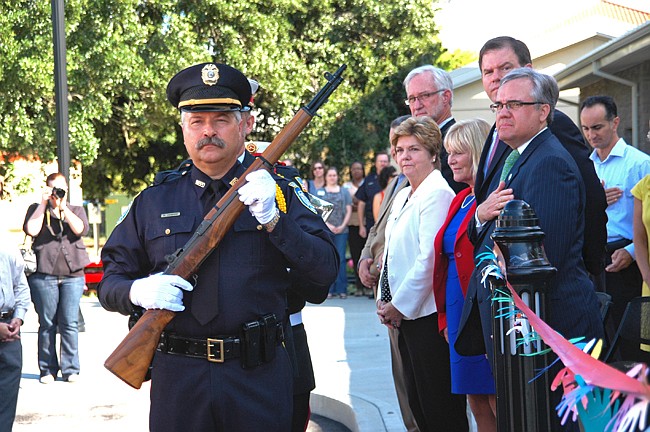- April 16, 2024
-
-
Loading

Loading

Winter Park wants more flexibility with negotiating fire and police pensions, but a recent request of the state level government raised suspicion and concern among some local retirees.
Winter Park City Commissioners made a statement to Florida officials at their April 14 meeting as they passed a resolution asking for home rule in regard to police and fire pensions – a response to state laws that control how cities use their pension funding.
The resolution asks the state of Florida to withdraw itself from the pension negotiation process, while ridding cities of a 1999 statute that forces them to set money aside for enhancing extra benefits.
That law prohibits Winter Park from using a total of $257,510 as of last September. City Manager Randy Knight said the growing pile of revenue could have gone toward existing benefits instead.
Home rule for municipalities makes sense when it comes to pension decisions, Mayor Ken Bradley said.
“Who knows better how to help the firefighters and police officers of Winter Park than the local people do?” Bradley said.
“The state could do this and give us pension reform and it costs the state not one red cent.”
Tax revenue provided under Florida Statues 175 and 185 could instead be used to pay down pension liabilities, Bradley said.
“Until sections 175 and 185 change in the state – there’s been some hope in the last year that that may change – we will have a pension challenge and liabilities will grow,” Bradley said.
“The state has been very hesitant to take on this matter and hopefully our resolution – in addition to other communities – will continue to encourage them.”
The city resolution calls for the removal of the minimum pension benefit standards as well – a measure that Knight said will allow officials to allocate money where firefighters and police officers want it most. Standards on pension factors like “multipliers” — a percentage of your annual salary used to determine your monthly retirement check — may not be appealing to every firefighter or police officer.
“There’s a minimum standard on what the multiplier can be and there’s minimum standards on age of retirement and all kinds of things,” Knight said. “They may not necessarily work and be the best for every plan statewide. The employees might rather have a better cost of living adjustment than a 20-year-and-out plan, where you work 20 and you can leave and retire.”
“We’d like to be able to negotiate … There might be certain things that they mandate as a minimum that nobody gives a flip about but it’s costing us money.”
But some retired police officers see the push from the city as a sign of ulterior motives. The city likely wants more flexibility with the pension so that money can be used for roadways and other city endeavors, said Bob Walker, former representative of the Winter Park Police Union and a retired Daytona Beach police officer.
“The state’s in there to protect the employees,” Walker said. “The cities look at their police and fire as hired help, the people who take out the trash. They’d like to free up some of these funds to put them into other things.”
Walker said he was concerned that the resolution would pave the way for a 401(a) plan, where employers decide on eligibility criteria, vesting schedules and contribution amounts. He said officers could end up receiving a smaller pension, with half their money going into a 401(k) and the other half going to defined benefits.
Tampering with existing plans could discourage aspiring police officers from joining the field, Walker said.
“It’s all a way for cities to try to get their unfunded liability down during these bad economic times, but they don’t realize that you get what you pay for,” Walker said. “Once you start having 401(k)s out there, who are you going to attract for police and fire? No one’s going to work for that; I wouldn’t dodge a bullet for one of those.”
Winter Park Fire Chief Jim White said any changes to the current pensions for fire and police would need to be approved by the pension advisory boards first. The city needs the flexibility to use the money as they see fit, as does every other municipality in Florida, he said.
Retired Winter Park Police Officer Randy Davison spent 20 years of service on the force. He said it should be the city’s highest priority to look after retired firefighters and police officers.
Davison said he understood the need to pay for paying down liabilities, but called the requested removal of the minimum pension benefit standards “very disconcerting.”
“I gave up 20 years of the prime of my life,” Davison said. “When my kids were growing up, I was at work. When my kids were opening up Christmas presents, I was out breaking up domestic violence fights … I missed those things that everybody else in the world was able to enjoy because I’m out there, because those firefighters are out there.”
“We gave all that up in the prime of life, and all we’re asking for is ‘Can we enjoy the golden years?’”